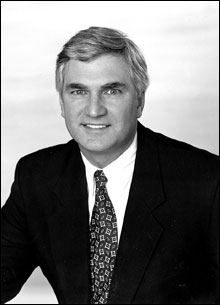
|
A man widely believed to be interested in becoming Maine’s next governor, Democratic Attorney General Steven Rowe, is refusing to defend the state’s Freedom of Access Act from a court ruling that would destroy the state’s open-government law almost entirely.
The ruling — that a three-man commission appointed by Rowe can keep its records secret because it was not a government body engaged in government business — is being appealed to the Maine Supreme Judicial Court, with the support of the Maine Civil Liberties Union.
If upheld, the ruling would allow Rowe — and any other government official — to “outsource” official business to a purportedly “independent” group of handpicked appointees, in complete certainty that the group’s actions will never become public.
The dust-up centers on the 1989 conviction of then-31-year-old farmer Dennis Dechaine for the 1988 rape and murder of 12-year-old Sarah Cherry, in Bowdoin. Dechaine was sent to prison for life, but a group of citizens who believe he is innocent have subsequently reviewed as much of the evidence in the case as possible — and have taken their efforts to the Legislature and through the courts to overrule repeated refusals from Rowe’s office to turn over documents. One member of the group, James Moore, a retired agent of the federal Bureau of Alcohol, Tobacco, and Firearms, has published two books detailing this investigation and the evidence he has found.
Even without access to crucial documents, Moore’s research raised enough questions in lawmakers’ minds that in 2003 they passed a law specifically forcing Rowe to open his office’s files to the public. And, in 2004, when Rowe violated that law by failing to hand over everything, Moore took him to court and won, getting copies of previously withheld state evidence — including information kept from the jury. Moore and others believe these documents prove Dechaine could not have killed Cherry.
Which brings us back to the Freedom of Access Act. After being forced to release his records, Rowe appointed the three-man commission to investigate the allegations, from Moore and others, of police and prosecutorial misconduct in the case. Rowe promised Dechaine’s advocates that he would publicize the commission’s report, which he did. It’s available on the AG’s Web site even today. It concludes that there was no “substantive merit” to the allegations of wrongdoing.
But when Moore asked to see the commission’s supporting evidence — the documents they reviewed and the notes from interviews they conducted — the commissioners refused, claiming that they are not, in fact, a government agency required to open their files.
In July, a judge agreed with them, but Moore has appealed that decision to the state’s highest court, arguing that the principles of open government demand their files be made public.
Rowe could, at this point, throw his weight behind Moore’s appeal and argue on behalf of the people of Maine that the Freedom of Access Act is gutted by the July ruling. But the attorney general, who has been selected four consecutive times by the Legislature to be the state’s chief law-enforcement officer, and who has once been formally asked by a resolution of the Maine House to support a retrial for Dechaine, appears to be on the side of secrecy. He is refusing to argue — in court or elsewhere — that the commission’s records should be made public.
Despite the fact that Rowe, in his memo appointing the commissioners, wrote that the group would be performing a “very important public service,” he now apparently supports the position that the report was not, in fact, the product of a public body.
Rowe did not return multiple calls seeking comment for this story.
“Presumably what [the commission] found makes the officials look good,” says Moore, professing confusion about why the commissioners have refused to open their files, and why the AG’s office has not gotten involved.
The MCLU is more direct about the long-term consequences of Rowe’s inaction: “The court order, unless overturned on appeal, creates a template by which public officials can dodge Freedom of Access laws by transferring their work to committees outside the scope of the Freedom of Access Act,” says Sigmund Schutz, from the Portland law firm Preti Flaherty, who is helping the MCLU with the case.
While we can lament his lack of resolve as attorney general, we can also act on it should Rowe ever appear on a ballot for governor.